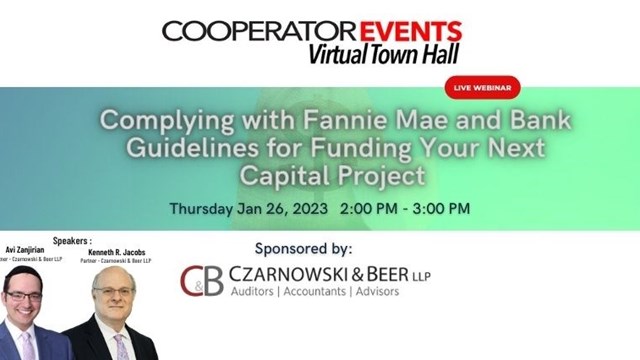With the stock market chugging along and the Great Recession of the late 'aughts in the rearview, the question might occur to some financially-savvy board members: Are our building's cash reserve assets performing at their best? Could they be better? Should our funds be invested in the most conservative manner possible, or should our association or corporation jump onto the stock market bonanza bandwagon? According to the professionals who spoke to The Cooperator on the topic of reserve investments, the answer to that last question is a resounding No.
What’s Required?
According to Mark Hakim, an attorney and Director of the Cooperative and Condominium Department for Manhattan-based law firm Chaves and Perlowitz, “Except in the case of a conversion, there are no legal requirements with respect to reserve funds, though there has been discussion in the past about legislatively requiring one. Note that a reserve fund must be established pursuant to the Reserve Fund Law for conversions and that a working capital fund, which may be established by a sponsor or board, is not a reserve fund.”
“The board of a condominium or cooperative is charged with the responsibility for investment decisions,” Hakim explains. “Often a board will rely upon a managing agent and/or the building’s accountant to determine where and how to invest. Usually, a building tries to stay with safe investments; bonds, treasury bills or money market accounts are the customary investment vehicles. However, as the amount of a building’s reserves increases into the millions, boards may engage institutional financial advisors to assist with their investment plan.”
Liquidity First
The most important consideration for co-op and condominium boards when contemplating investment of their reserve funds is liquidity. According to Karen Sackstein, an accountant and a partner at The Condo Queens, an accounting firm located in Fair Lawn, New Jersey that specializes in condominium associations, “Liquidity is defined simply as money you can access right away.” While the standard accounting definition of 'liquid' is anything invested for less than 90 days, Sackstein believes that’s not liquid enough for condo and co-op situations. “Reserve funds will have a combination of liquid instruments,” she says, “typically, [condos and co-ops use] money market accounts and/or short-term certificates of deposit (no more than 30 days). These instruments can all be accessed without penalties for early withdrawal.”
How much should be kept in cash or near cash equivalents depends on an array of variables. These factors include the extent of common elements, the replacement cost of those elements, and the age of the property. So for argument’s sake, consider a townhouse style condominium complex where members maintain their own HVAC systems within their units. A community with this situation would probably require less cash for reserve funding then, say, a high-rise apartment building with an equivalent number of units that has central HVAC and elevators, which are expensive systems to maintain or replace. Sackstein recommends that her clients keep two to three months worth of working capital on hand at all times. That way, “If there is an emergency, the association will have a cushion and won’t incur early withdrawal fees on invested reserve funds.” She advises her board clients “never run too close – because it’s not your money!”
Short-Term Instruments
Mark Love is a Worcester, Massachusetts-based accountant specializing in condominium communities. “Condominium communities are ultra-conservative investors,” he says. “Ninety-nine percent of our clients are invested in only CDs and money market funds. Almost none are in equities,” though he has seen that very occasionally. Like Sackstein, Love takes pains to remind boards that “These funds are ‘other-people’s-money,” – or 'OPM,' as it’s more commonly known. Boards must be very careful about that. “We had one condo client that dabbled in the bond market, but very conservatively. That investment would be considered pretty secure.”
Love attributes the very conservative money management habits of today's co-op and condo boards to board members themselves being more financially savvy than their predecessors 10 or 15 years ago. More often than not, board members are successful business people or professionals, and run their associations in a pretty tightly-monitored way, not unlike a small business. This higher level of knowledge and experience has led to a more professional and successful level of management for many multifamily communities. As Love tells his clients, “The needle should always be pointed toward liquidity – early liquidity being the order of the day.”
Laddering, and Investment Policy Statements
The investment strategy most often employed with co-op and condo reserve funds is known as laddering. Love explains the concept in simple terms: “All the instruments don’t come due at the same time. The maturities are staggered according to cash liquidity needs. This enables the co-op or condo to take advantage of whatever the highest yield is that’s available at maturity time. If the funds coming due aren’t needed, they can be reinvested at the highest available rate, or can be kept liquid till a suitable reinvestment rate is found.”
Chris Nyborg is an accountant specializing in high-end condominium communities in Chicago. She recommends that her clients adopt Investment Policy Statements (IPS's). Investment Policy Statements lay out exactly what an association’s goals are, and how they can be achieved. Approved and prohibited investing strategies may be outlined within the statement as well. Many of her clients use these, and she believes they are very effective.
“Security and safety of the assets are the most important considerations,” says Nyborg. “We don’t want our clients to lose principal, so we advise them to choose lower risk investments like CDs. We also look at return on investment. Laddering, coupled with an IPS, has been successful in producing the best overall results for our clients.”
All three accountants, Sackstein in New Jersey, Love in Massachusetts, and Nyborg in Illinois, agree on two major goalposts in managing reserve funds: First and foremost, no equity investments – not even with windfall monies. It’s just too risky. The second major point: hire a qualified money manager to work with your board and property manager on reserve fund management and investment. Don't try to go it alone, even if your board includes financial professionals. It's always better to have an outside, objective set of eyes looking out for your community's funds.
Words from a Professional
John A. Busco is a financial advisor and Senior Vice President at Morgan Stanley in Toms River, New Jersey. His typical outreach to clients involves many steps. “We first make sure the investment considerations fit within an association’s written IPS. We look to make knowledge-based recommendations by referring to their reserve study. We need to keep in mind the time frame of expenses, also taking into consideration current maturities and contributions. Lastly, we encourage the board to plan, rather than attempting to predict things like the course of interest rates.”
When it comes to how an association or co-op's portfolio should be structured, Busco says that, “For the most part, the investment mix is one of principal preservation – mostly in U.S. treasuries and certificates of deposit (CDs). The composition will vary, based usually on the age of the community and what type of planning prior boards conducted. This will help the association determine if they are over- or under-funded. We offer four different types of certificates of deposit: bullets, callable fixed, step-up rates and market- linked deposits. In my opinion, right now step-up rates are the most popular. US Treasury TIPS are gaining in their use, but historically fixed rate bullets are the most common.”
Illustrating why an investment professional represents such a powerful asset to a board as they navigate this part of their administrative duty, Busco says, “We look at liquidity needs from this standpoint: is the money needed currently, or in a short period of time? Day-to-day liquidity is by far the lowest yield item. A one-month certificate of deposit may offer a higher return, so managing short-term cash is vital to the HOA. I don’t see anything 'typical.' When we meet with boards, we encourage the use of what we refer to as customized laddering. We want to make knowledge-based decisions, and place maturities in the time slots identified by the reserve study as to when the HOA will face modeled expenses.”
Good and Bad Results
To conclude, Nyborg mentions two experiences she’s had that underline the need for both financial and professional prudence in managing community reserve funds.
In one case, she was called in by a condo association to do a forensic accounting study after moneys disappeared from their reserves. Nyborg determined that the managing agent had been defrauding the association. He claimed to have deposited their reserve funds in various accounts, which he detailed monthly...on his own stationary. The board never saw a statement from any bank or financial institution. In the end, it was determined that the managing agent had absconded with the funds.
In another instance, a large condominium located in downtown Chicago with many millions of dollars in reserves brought in a money manager to oversee their reserve funds. By working closely with the board, using the property's reserve study to guide its investment strategy, and an astute laddering approach, the money manager was able to invest in the safest, most profitable instruments, and achieve a return almost double what was typical for similar properties.
In the end, investments on behalf of a co-op or condo community are just that – they're decisions made with other peoples' money. When investing your building’s reserves, be prudent and be smart, and get the best professional advice – just as you would do for yourself.
A J Sidransky is a staff writer/reporter with The Cooperator, and a published novelist.










Leave a Comment